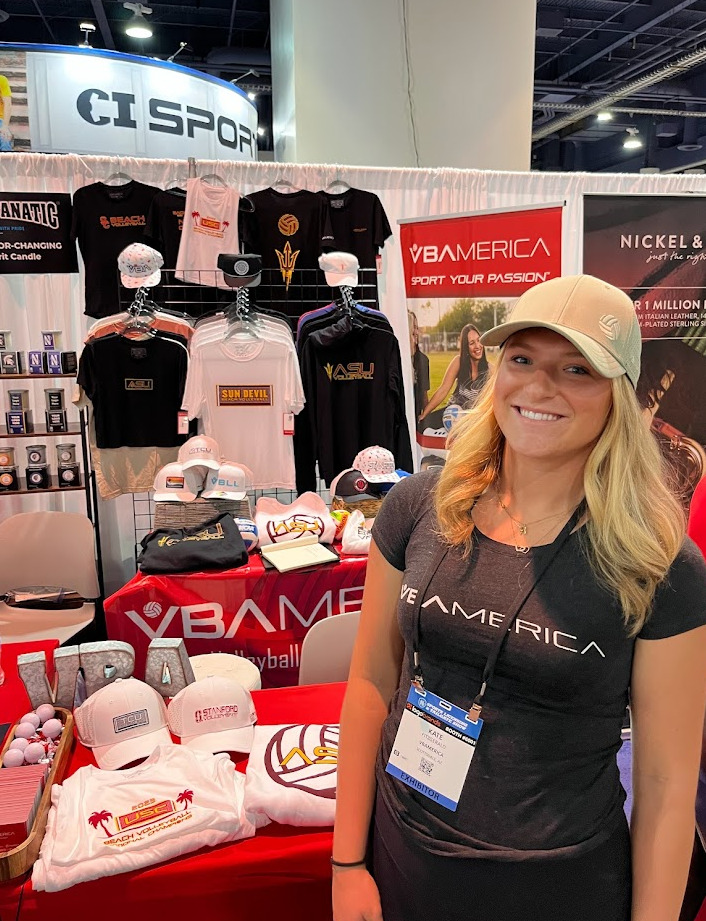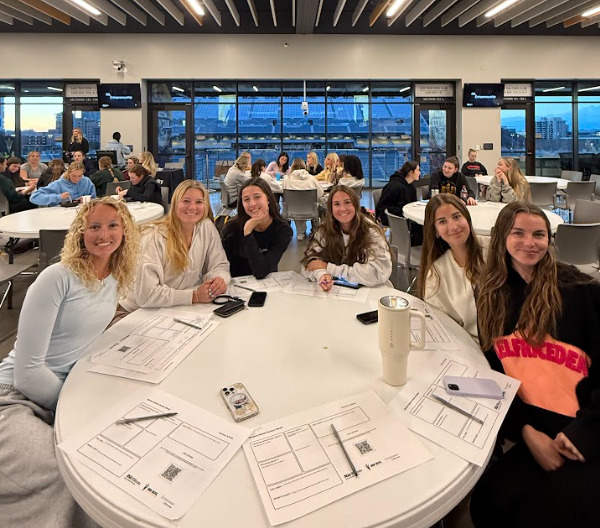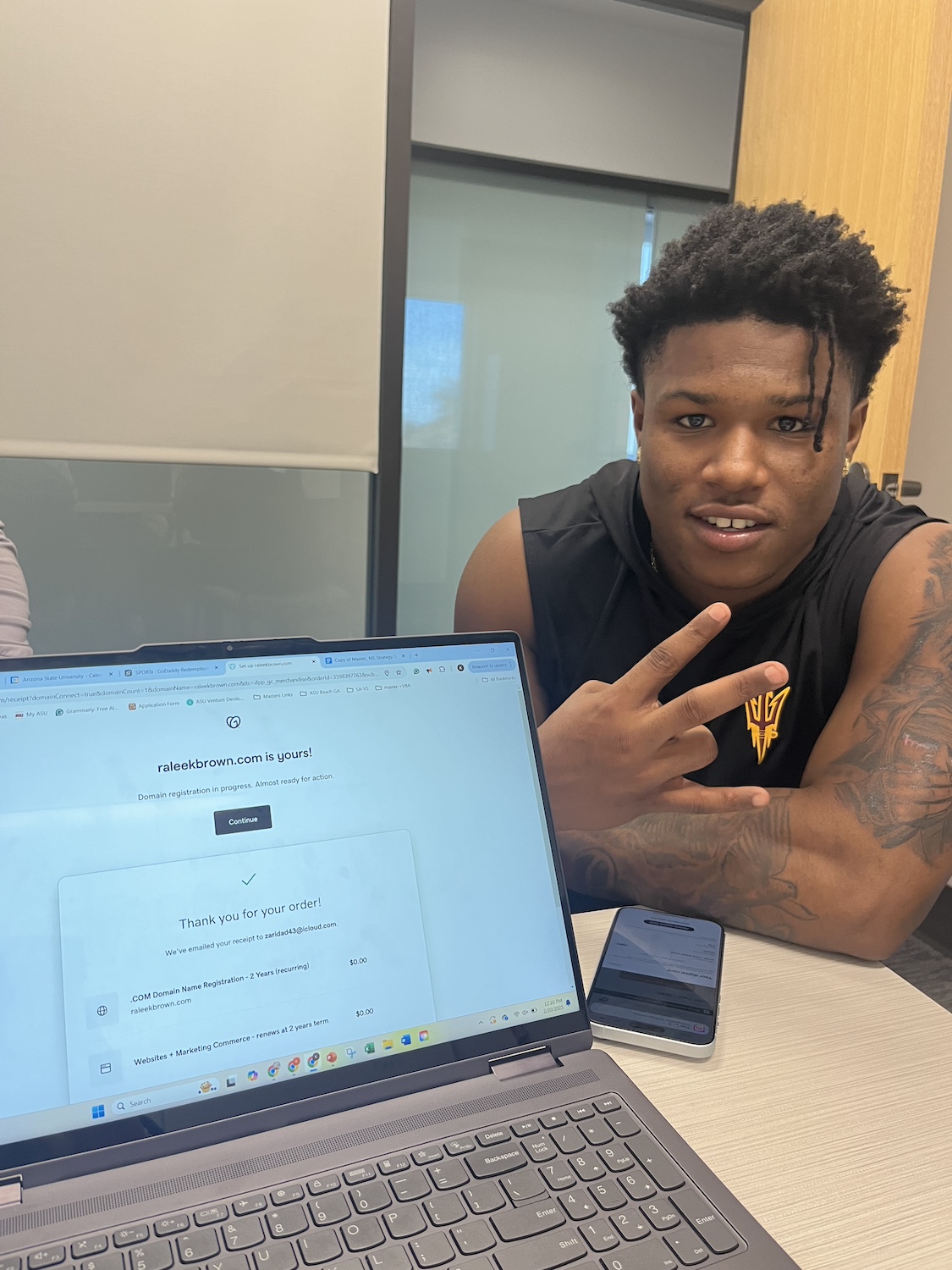
Kate Fitzgerald, one of the co-founders of the Student-Athlete Venture Studio at Arizona State University, jumps up to spike during a beach volleyball game between Arizona State and the University of Southern California. (Image courtesy of Arizona State University.)
A rule change by the National Collegiate Athletic Association (NCAA) opened the playing field for student-athletes to monetize their name, image and likeness for the first time in 2021. Still, not every student-athlete can rely on their personal brand to cover all their financial needs. Luckily for those attending Arizona State University (ASU), the new Student-Athlete Venture Studio is expanding its lineup this fall to help time- and resource-strapped athletes harness their entrepreneurial potential.
Before the rule change — which began with an interim policy spurred by a Supreme Court ruling that is still in effect but has not been made permanent — student-athletes weren’t allowed to make any money off of their talents, even though their games brought in billions of dollars for their schools. In 2019 alone, Division One athletes were behind a whopping $15.8 billion in earnings on everything from ticket sales to merchandise, according to the NCAA.
Student-athletes who violated the previous name, image and likeness regulations faced stiff penalties. For example, Reggie Bush, who played for the University of Southern California before going on to the NFL, lost the prestigious Heisman Trophy awarded to him as the top player in college football in 2025 because he received a car and cash gifts during his time on the field. His award was reinstated last year.
Despite dedicating their youth to athletics, most student-athletes don’t go on to play their sport professionally after college. Their dedication to their sport can stunt their earnings in other ways — keeping them from working other jobs, applying for internships, starting businesses or preparing for a career after college, Kate Fitzgerald, one of the co-founders of the Student-Athlete Venture Studio at ASU, told TriplePundit.
“Before [the new name, image and likeness policy] existed, it was very hard for student athletes to really have any sort of income,” Fitzgerald said. “They were kind of bound to the university.”
Between a full class schedule and the 20 to 30 hours spent on training and other sport-related activities each week, student-athletes don’t have time left to work, she said. The policy change allows “them to have income and set themselves up for career and life after sport,” Fitzgerald said.
But not all student-athletes can take advantage of lucrative brand deals or become celebrities. As a beach volleyball player at ASU, Fitzgerald focused her efforts on founding VBAmerica, a volleyball-inspired clothing company she said is designed to inspire passion and confidence. She did so by tapping into the Venture Devils program at ASU, an entrepreneurial support system that offers students networking, mentorships, funding and other resources.

“I was able to receive my first round of grant funding when I was a junior at ASU,” Fitzgerald said. “This funding helped me hold my first pop-up and then also get licensed with the university.”
After licensing her clothes with ASU, she ended up having six VBAmerica products placed in the university’s bookstores. From there, grant funding helped her score more pop-ups to make sales and promote awareness of her brand and expand to other universities like USC, UCLA, Stanford and Vanderbilt.
“While I was doing this, I realized ASU has all these resources I was trying to take advantage of, but I didn't have the availability to, being a student-athlete,” Fitzgerald said. She noticed many other student-athletes needed access to those same resources.
With that need in mind, Fitzgerald and her mentor from the Venture Devils program, Jeff Kunowski, created the Student-Athlete Venture Studio at ASU to support student-athletes on their entrepreneurial journeys. The program offers access to resources like time-saving tech, one-on-one mentoring, summer internships with partner companies, grant funding contests, corporate sponsorships, workshops, monthly events and educational content tailored to their busy schedules. Fitzgerald said they designed the program to offer all the things she wished she had access to when developing her business.

Funding will vary from $250 microgrants for student-athletes beginning their entrepreneurial journey to thousands of dollars in grant money to kick off a company, Fitzgerald said. Marketing grants will also be available to those who are trying to land name, image and likeness contracts.
Fitzgerald and Kunowski worked with ASU’s J. Orin Edson Entrepreneurship and Innovation Institute, where Kunowski is also the associate director of innovation programs, and the tech company GoDaddy to launch the program. GoDaddy provided over 1 million dollars in cash and in-kind donations, Fitzgerald said.
The Student-Athlete Venture Studio soft-launched in January and will open up to all student-athletes at the university in the fall.
“We had two student athletes pitching at this recent demo day,” Fitzgerald said, referring to a campus-wide grant funding contest at ASU.
Sierra Ryan, a lacrosse player, hit her pitch out of the park, scoring a $13,000 grant to hire a team to expand her coding company. Ryan used the Student-Athlete Venture Studio’s partnership with Empower by GoDaddy, the company’s global social impact program, to create a website that helped legitimize her business.
The other student-athlete, who is on the wrestling team, also scored grant funding, though Fitzgerald wasn’t able to say exactly how much he will receive. Additionally, GoDaddy reported that 22 student-athletes redeemed product codes to begin working on their business goals ahead of the Student Athlete Venture Studio’s full launch.
“We’re thrilled to combine the business-building power of GoDaddy Airo with the drive and immense potential of these enterprising student-athletes,” Jared Sine, chief strategy and legal officer at GoDaddy, told TriplePundit in an email. “According to our research, 50 percent of Gen Z aspire to become entrepreneurs, and through Empower by GoDaddy, we’re accelerating this journey for these young innovators by providing them with the tools they need to bring their business dreams to life off the field.”

Fitzgerald said she thinks the program can be replicated at other universities, but ASU’s existing innovation programs for student entrepreneurs might have given them a home-court advantage. She’s confident that the program will succeed regardless of further name, image and likeness policy changes.
“Right now, the challenge is, this is such a new initiative and a new outlook on name, image and likeness that [it’s just about] getting people involved,” Fitzgerald said. “We want to work with as many people as we can, and help these students.”

Riya Anne Polcastro is an author, photographer and adventurer based out of Baja California Sur, México. She enjoys writing just about anything, from gritty fiction to business and environmental issues. She is especially interested in how sustainability can be harnessed to encourage economic and environmental equity between the Global South and North. One day she hopes to travel the world with nothing but a backpack and her trusty laptop.














